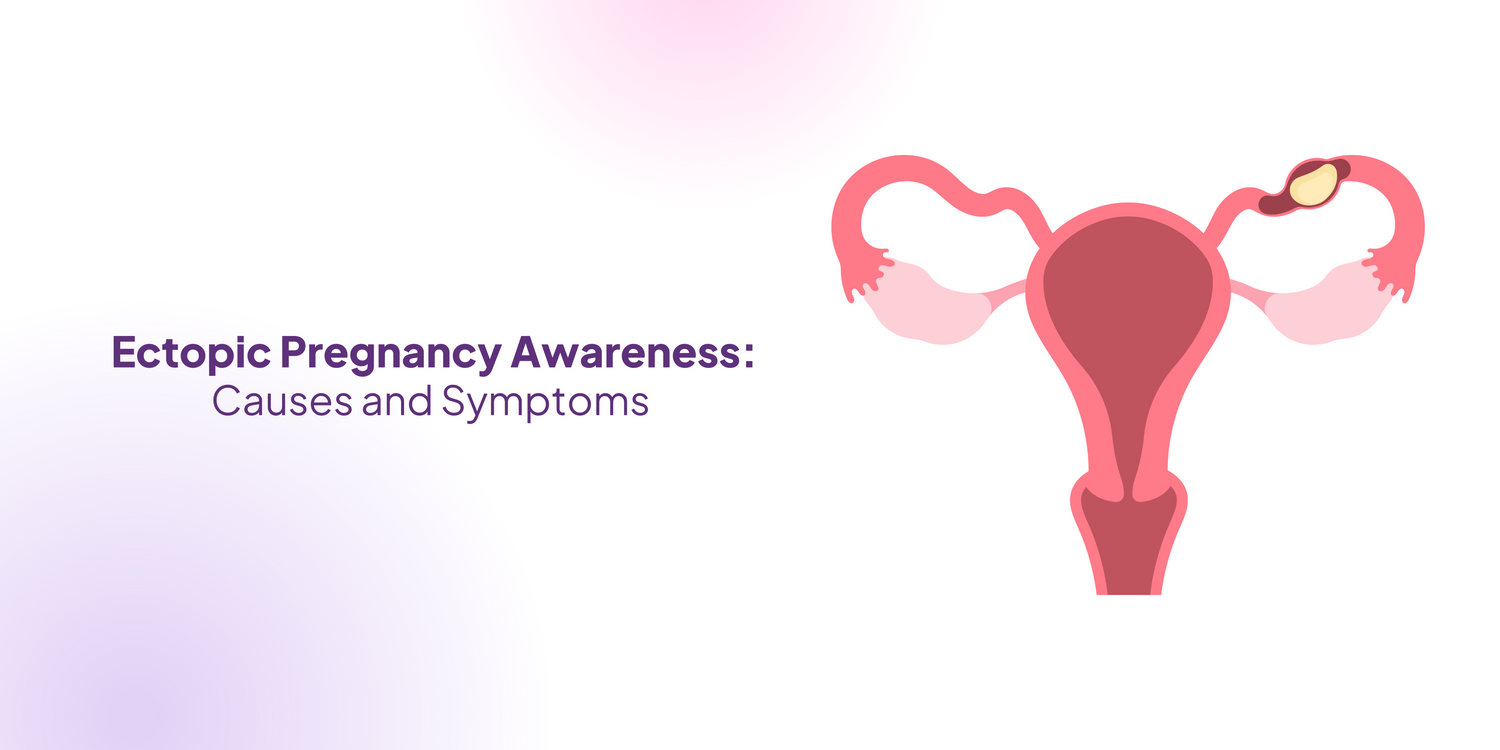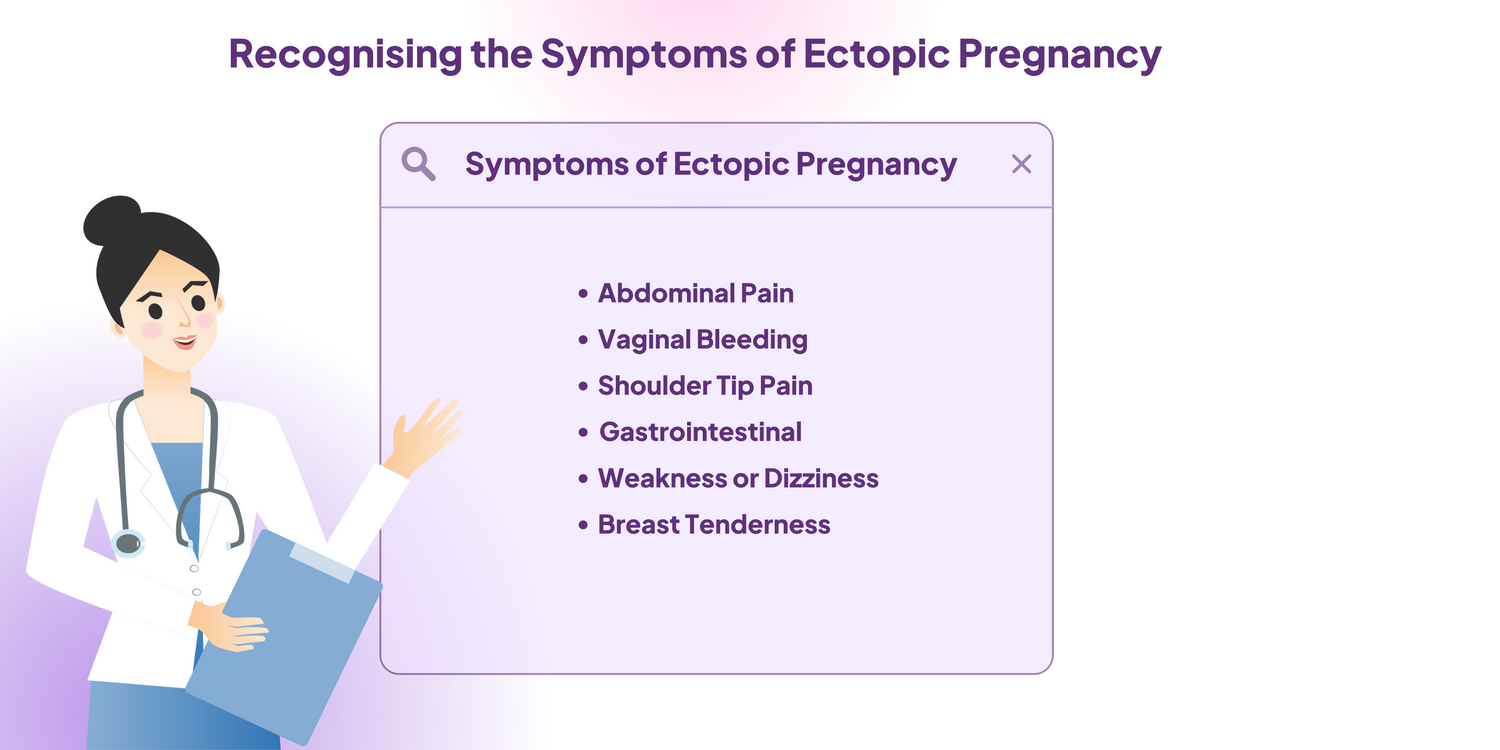Ectopic Pregnancy Awareness: Causes and Symptoms
Aug 4 • 8 min read

Table of Content
Congratulations on your pregnancy journey! As an expectant mother, you're likely filled with excitement, anticipation, and perhaps anxiety about what lies ahead. While pregnancy is often a joyous time, it's important to be informed about potential complications. One such condition that every mom-to-be should be aware of is ectopic pregnancy.
In this blog post, we'll explore ectopic pregnancy in detail, covering its causes, symptoms, and why awareness is crucial for your health and well-being. Don't worry; we'll approach this topic carefully and provide you with the knowledge you need to navigate your pregnancy journey confidently.
What is an Ectopic Pregnancy?
Let's start with the basics. Ectopic pregnancy happens when a fertilised egg implants and grows outside the uterus, usually in one of the fallopian tubes. In a normal pregnancy, the fertilised egg travels through the fallopian tube and implants in the uterine lining. However, in an ectopic pregnancy, this process goes awry.
Ectopic pregnancies are uncommon, accounting for about 1-2% of all pregnancies, yet they can be dangerous and potentially fatal if not addressed. That is why, as a mother-to-be, you must be aware of the indications and symptoms.
Causes of Ectopic Pregnancy
You might be wondering, "What causes an ectopic pregnancy?" While the exact cause isn't always clear, several factors can increase your risk. Let us look into some of the most typical causes:
- Fallopian Tube Damage: Any condition that narrows or blocks the fallopian tubes can increase the risk of an ectopic pregnancy.
This includes:
- Previous pelvic or abdominal surgery
- Pelvic inflammatory disease (PID)
- Previous ectopic pregnancy
- Hormonal Factors: Certain hormonal imbalances or the use of hormonal contraceptives may impair the egg's passage through the fallopian tube.
- Fertility Treatments: Some fertility treatments, such as in vitro fertilisation (IVF), can slightly increase the risk of ectopic pregnancy.
- Smoking: Cigarette smoking has been associated with an increased risk of ectopic pregnancy.
- Age: Women above the age of 35 are more likely to develop an ectopic pregnancy.
- Structural Abnormalities: Some women may have unusually shaped fallopian tubes, making it harder for the egg to travel to the uterus.
Remember, having one or more of these risk factors doesn't mean you'll experience an ectopic pregnancy. It simply means you should be extra vigilant about potential symptoms and discuss any concerns with your healthcare provider.
Recognising the Symptoms of Ectopic Pregnancy

As a mom-to-be, it's essential to familiarise yourself with the signs and symptoms of ectopic pregnancy. Early detection can make a significant difference in treatment options and outcomes. Here are the main symptoms to look out for:
- Abdominal Pain: This is usually the first and most prevalent symptom. The pain may be sharp, stabbing, or crampy. It typically occurs on one side of the lower abdomen but can spread across the pelvis.
- Vaginal Bleeding: Light vaginal bleeding or spotting, often described as different from a normal period, can be a sign of ectopic pregnancy.
- Shoulder Tip Pain: As strange as it may sound, pain at the tip of your shoulder can be a symptom of ectopic pregnancy. This happens when blood from a burst fallopian tube irritates the wall of the lungs.
- Gastrointestinal Symptoms: Some women experience nausea, vomiting, or diarrhoea.
- Weakness or Dizziness: Feeling faint or dizzy, especially when standing up, can be a sign of internal bleeding.
- Breast Tenderness and Other Pregnancy Symptoms: Remember, an ectopic pregnancy is still a pregnancy, so you may experience typical early pregnancy symptoms like breast tenderness, fatigue, and nausea.
It's important to note that these symptoms can vary from woman to woman. Some may experience several symptoms, while others might only have one or two. In some cases, there may be no symptoms until the ectopic pregnancy ruptures, which is a medical emergency.
When to Seek Medical Attention?
As an expectant mother, you should never hesitate to reach out to your healthcare provider if something doesn't feel right. When it comes to ectopic pregnancy, early detection is crucial. Seek immediate medical attention if you experience:
Severe abdominal or pelvic pain, especially if it's on one side
Heavy vaginal bleeding
Dizziness or fainting
Shoulder tip pain
Even if your symptoms are minor, it is still best to be cautious and consult with your doctor. They can perform the necessary tests to rule out or confirm an ectopic pregnancy.
Diagnosis and Treatment of Ectopic Pregnancy
If your doctor suspects an ectopic pregnancy, they will likely perform the following tests:
Blood Tests: To measure the levels of human chorionic gonadotropin (hCG), a hormone produced during pregnancy.
Ultrasound: To visualise the location of the pregnancy.
Pelvic Exam: To check for pain, tenderness, or masses in the pelvic area.
If an ectopic pregnancy is confirmed, treatment will depend on how far along the pregnancy is and whether there's been a rupture. The main treatment options include:
Medication: If caught early, a drug called methotrexate can be used to stop the growth of pregnancy tissue.
Surgery: In cases where medication isn't suitable or if the fallopian tube has ruptured, surgery is necessary. This can be done laparoscopically (minimally invasively) in many cases.
It's important to understand that, unfortunately, an ectopic pregnancy cannot be moved to the uterus or saved. The focus of treatment is on protecting the mother's health and preserving her fertility for future pregnancies.
Coping with an Ectopic Pregnancy
If you're diagnosed with an ectopic pregnancy, it's normal to feel a range of emotions, including shock, sadness, anger, and grief. Remember, it's not your fault, and you're not alone. Here are some tips for coping:
Allow yourself to grieve: Even though it was early in the pregnancy, it's okay to mourn the loss.
Seek support: Talk to your partner, family, friends, or a counsellor about your feelings.
Join a support group: Connecting with other women who have experienced ectopic pregnancy can be helpful.
Take care of yourself: Focus on your physical and emotional recovery.
Look to the future: Most women who have had an ectopic pregnancy can go on to have healthy pregnancies in the future.
Preventing Ectopic Pregnancy
While it's not always possible to prevent an ectopic pregnancy, there are steps you can take to reduce your risk:
Practice safe sex: Using condoms can help prevent sexually transmitted infections that can lead to PID.
Quit smoking: If you smoke, now is a great time to quit for your overall health and to reduce your risk of ectopic pregnancy.
Maintain a healthy weight: Being overweight or underweight can affect your hormonal balance and increase your risk.
Consider your birth control options: Talk to your doctor about the best contraceptive methods for you, especially if you've had a previous ectopic pregnancy.
Manage existing health conditions: If you have conditions like endometriosis or PID, work with your doctor to manage them effectively.
The Importance of Early Prenatal Care
One of the best ways to ensure a healthy pregnancy and catch any potential complications early is to start prenatal care as soon as you know you're pregnant. Regular check-ups allow your healthcare provider to monitor your pregnancy closely and address any concerns promptly.
During your first prenatal visit, be sure to discuss any risk factors you may have for ectopic pregnancy. Your doctor can then tailor your care plan accordingly.
Conclusion
As you continue on your pregnancy journey, remember that knowledge is power. Being aware of ectopic pregnancy's causes, symptoms, and risk factors empowers you to be proactive about your health and your baby's well-being.
While the possibility of complications can be scary, try not to let worry overshadow the joy of your pregnancy. The vast majority of pregnancies progress normally, and with good prenatal care, potential issues can often be detected and addressed early.
Stay in tune with your body, don't hesitate to ask questions or voice concerns to your healthcare provider, and most importantly, take time to enjoy this special period in your life. Your journey to motherhood is unique and precious; embrace it with both awareness and excitement.
Remember, you're not just growing a baby; you're growing as a person, preparing to take on one of life's most rewarding roles. Trust your instincts, arm yourself with knowledge, and look forward to the beautiful adventure of motherhood that lies ahead.
FAQs:
Q: What is an ectopic pregnancy?
A: An ectopic pregnancy occurs when a fertilised egg implants and begins to grow outside the uterus, most commonly in one of the fallopian tubes. This can be serious and potentially life-threatening if left untreated.
Q: How common is an ectopic pregnancy?
A: Ectopic pregnancies are relatively rare, occurring in about 1-2% of all pregnancies.
Q: What are the treatments for ectopic pregnancy?
A: Treatment depends on how far along the pregnancy is and whether there's been a rupture. Options include:
Medication (methotrexate) to stop the growth of pregnancy tissue, if caught early
Surgery (laparoscopic surgery) to remove the ectopic pregnancy, especially if the fallopian tube has ruptured.
Q: Can an ectopic pregnancy be moved to the uterus?
A: No, unfortunately, an ectopic pregnancy cannot be moved to the uterus or saved. The focus of treatment is on protecting the mother's health and preserving her fertility for future pregnancies.
Q: Why is early prenatal care important?
A: Early prenatal care ensures close monitoring of your pregnancy, allowing healthcare providers to detect and address potential complications early. During your first prenatal visit, discuss any risk factors for an ectopic pregnancy with your doctor.
Q: What should I do if I suspect I have an ectopic pregnancy?
A: If you suspect an ectopic pregnancy, seek medical attention immediately. Early detection and treatment are crucial for your health and well-being.